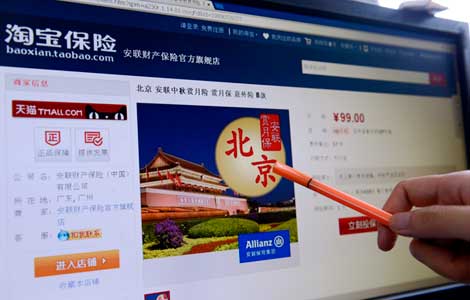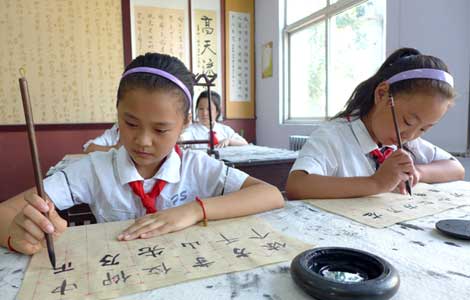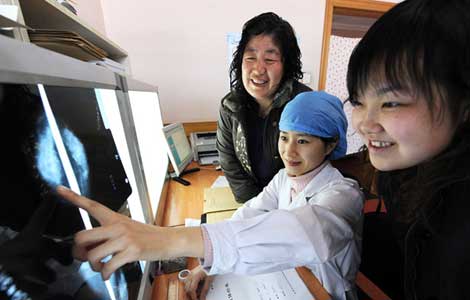From the Chinese Press
Updated: 2013-08-28 07:55
(China Daily)
|
||||||||
Govt must cut cesarean birth rate
The rate of cesarean births in China this year is three times higher than the recommended World Health Organization level. And although the cesarean birth rate has reached 70-80 percent in some regions, people seem indifferent to the dangers associated with the procedure, says an article in Beijing News. Excerpts:
The WHO conducted a worldwide survey in 2007-08, which showed that China had the highest cesarean section birth rate in the world; it was 46.5 percent. The rate remains high even after more than fiver years of the survey.
According to relevant department officials, it is difficult to evaluate the qualifications of professionals working in the maternity care sector who recommend cesarean section to couples because of lack of scientific data. But the key problem lies with the government policy, which does not provide proper guidelines for maternity care and childbirth.
Since arranging for natural delivery may be more time and energy consuming for doctors and hospitals, they recommend would-be mothers to opt for cesarean section. The decision is also based on monetary considerations, because the charge for natural delivery, in a Beijing hospital for example, is 2,000 yuan ($326.6) whereas for a cesarean section it is 3,800 yuan. If we count in the necessary formalities for cesarean birth, the cost will be still higher.
Government departments have not paid attention to the high cesarean birth rate. As a result, even in a city like Beijing, which has the best medical resources and facilities in the country, local authorities have failed to reduce the cesarean birth rate.
Perhaps the government should offer monetary incentive to hospitals and doctors that encourage would-be mothers to opt for natural delivery to cover their "economic loss" in order to reduce the rising cesarean birth rate.
Home schooling not a bad idea
A recent survey shows that about 18,000 elementary-level students are undergoing "home schooling", with their mothers being chiefly responsible for their education. The children's parents have decided to coach them at home because they don't agree with the education being imparted in schools, says an article in Chongqing Times. Excerpts:
Some parents even in other countries have chosen to teach their children at home. In the early 1970s when home schooling first gained acceptance in the US, only about 2,000 families were coaching their children at home. But by 2003, their number had jumped to 1.1 million, accounting for 2.2 percent of the then 55 million school-age children.
Most of the parents in China reject the idea of home schooling because the practice does not have legal support. But by doing so they may be ignoring students' fundamental rights.
In countries where home schooling has got the official stamp, only parents who have government certification to teach can coach their children at home. And, of course, they have to use recommended textbooks and regularly report to school authorities about the progress of the wards. In comparison, very few in China cares about this group.
Moreover, according to the survey, four of the top five reasons why parents choose home schooling are related to deep-rooted problems in traditional schools. Also, some parents who opt for "home schooling" for their wards prefer to send them abroad for studies. These two factors make it necessary for the government to provide parents with multiple education channels for their children to choose from.
To ensure that children undergoing home schooling do not suffer in the future, the government must recognize and regulate the practice, because diversification of education will not only help phase out the existing exam-oriented education, but also further the original purpose of quality education.
(China Daily USA 08/28/2013 page12)

 Five apps to help you 'breathe' in Beijing
Five apps to help you 'breathe' in Beijing
 Wozniacki survives battle with Chinese qualifier
Wozniacki survives battle with Chinese qualifier
 Moscow air show opens with flight demonstrations
Moscow air show opens with flight demonstrations
 US preparing for probable strike on Syria
US preparing for probable strike on Syria
 Putting money on full moon
Putting money on full moon
 Language list aims to pass on Chinese culture
Language list aims to pass on Chinese culture
 Cancer patient delivers healthy baby
Cancer patient delivers healthy baby
 Chinese navy starts escort mission at Gulf of Aden
Chinese navy starts escort mission at Gulf of Aden
Most Viewed
Editor's Picks

|

|

|

|

|

|
Today's Top News
US envoy to visit DPRK to secure prisoner's release
US 'must consider impact' of winding down QE
China gearing up for plenary session
Japan suspends rocket launch at last minute
Global expertise a scarce asset for employers
Sino-Japanese meeting at G20 ruled out
New time limits for visa processing
Trending news across China
US Weekly

|

|







